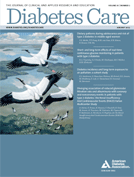 | |
| Discipline | Diabetes |
|---|---|
| Language | English |
| Edited by | Steven Kahn |
| Publication details | |
| History | 1978–present |
| Publisher | American Diabetes Association (United States) |
| Frequency | Monthly |
| 16.2 (2022) | |
| Standard abbreviations | |
| ISO 4 | Diabetes Care |
| Indexing | |
| ISSN | 0149-5992 (print) 1935-5548 (web) |
| OCLC no. | 60638990 |
| Links | |
Diabetes Care is a monthly peer-reviewed medical journal published since 1978 by the American Diabetes Association. The journal covers research in the following five categories:
Contents
- clinical care/education/nutrition/psychosocial research,
- epidemiology/health services research,
- emerging treatments and technologies,
- pathophysiology/complications,
- cardiovascular and metabolic risk.
The journal also publishes clinically relevant review articles, letters to the editor, and commentaries. [1]
The current Editor-in-Chief is Steven Kahn.
The journal has a 2022 impact factor of 16.2. [2] The 2023 impact factor was 14.8, ranking 6th of 187 in journals of endocrinology/metabolism.